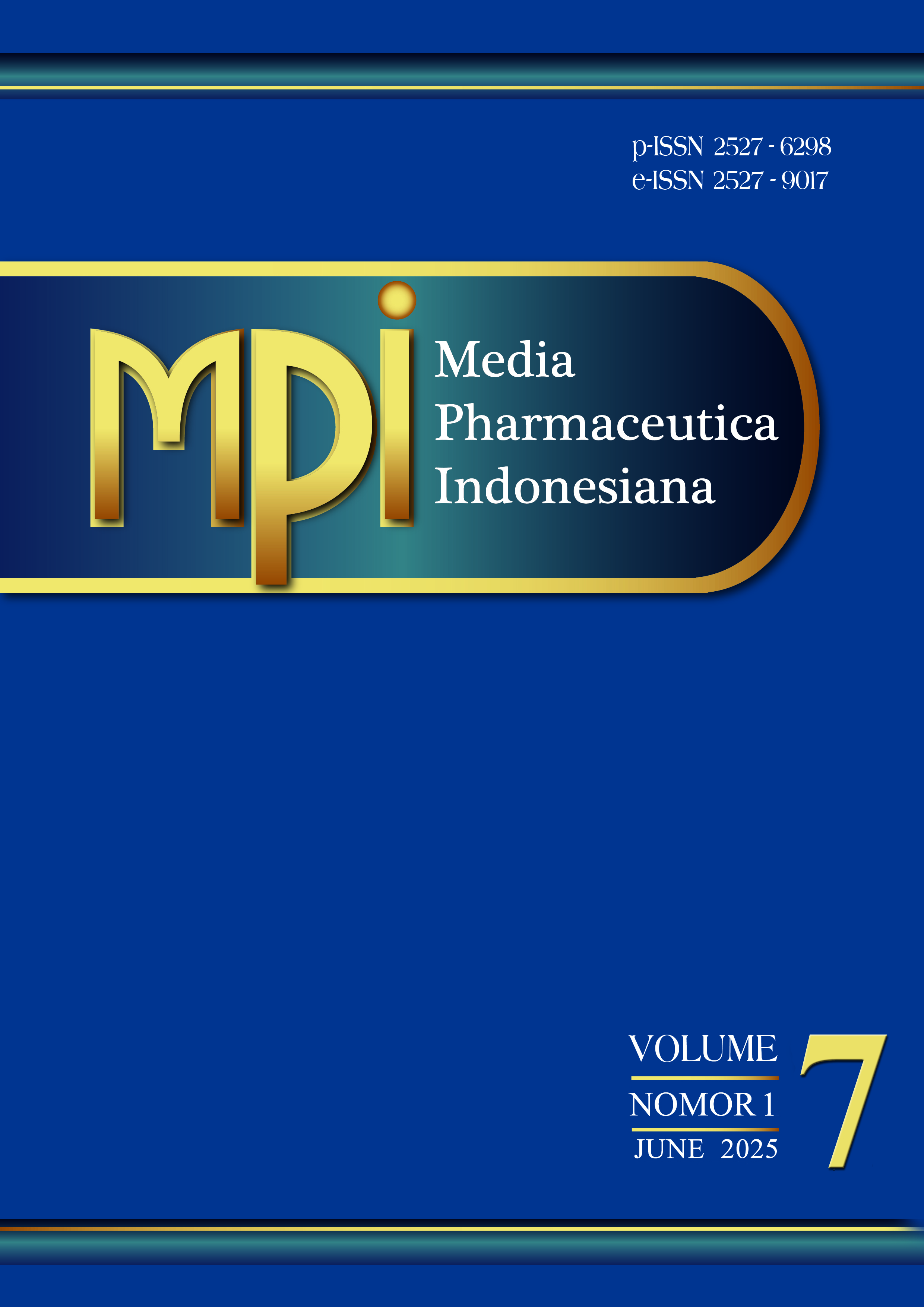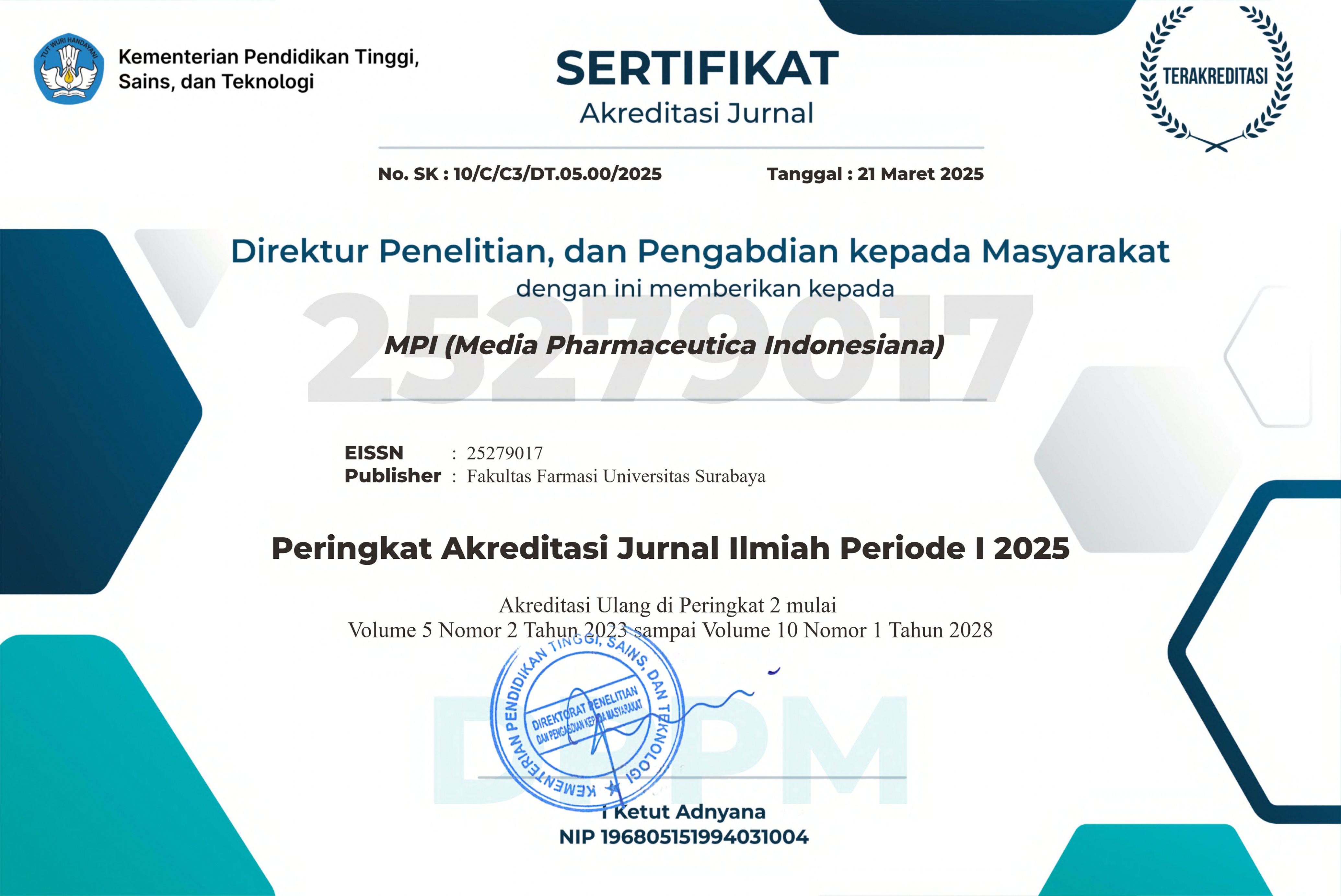Stabilitas Fisikokimia dan Penghantaran Polisakarida Acemannan dalam Body Scrub Ekstrak Lidah Buaya: Variasi Tween 80 dan Gliseril Monostearat
 Abstract Views:
306 times
Abstract Views:
306 times
 PDF Downloads:
294 times
PDF Downloads:
294 times
Abstract
Lidah buaya memiliki manfaat menutrisi dan melembapkan kulit karena kandungan polisakarida acemannan sebagai humektan, sehingga sering digunakan dalam produk perawatan tubuh, termasuk body scrub. Stabilitas krim body scrub dipengaruhi komposisi emulgator tween 80 dan gliseril monostearat yang menjaga homogenitas dan stabilitas produk selama penyimpanan. Penelitian ini bertujuan untuk menganalisis pengaruh variasi konsentrasi emulgator terhadap stabilitas dan penghantaran acemannan dalam body scrub lidah buaya. Body scrub diformulasikan dalam tiga formula yang mengandung ekstrak lidah buaya, rice bran oil, virgin coconut oil, microbeads polyethylene, dan kombinasi emulgator tween 80 dan gliseril monostearat dengan konsentrasi 4%, 5%, dan 6% untuk formula I, II, dan III. Pengamatan stabilitas dilakukan pada hari ke-0, 7, 14, dan 30 untuk parameter organoleptis, berat jenis, tipe emulsi, ukuran droplet, viskositas, sifat alir, daya sebar, dan pH. Penghantaran zat aktif berkhasiat diamati dari parameter kadar acemannan. Ketiga formula body scrub memenuhi spesifikasi. Variasi konsentrasi emulgator mempengaruhi ukuran droplet dan stabilitas body scrub. Body scrub formula III dengan konsentrasi total emulgator 6% merupakan formula terbaik yang stabil pada keseluruhan parameter termasuk kadar acemannan tertinggi, serta keunggulan pada karakteristik ukuran droplet yang lebih kecil.
Aloe vera is widely used in body care products due to its moisturizing and skin-nourishing properties, attributed to the presence of the polysaccharide acemannan, a natural humectant. The stability of body scrub creams is influenced by the composition of emulsifiers such as tween 80 and glyceryl monostearate, which maintain product homogeneity during storage. This study aimed to evaluate the effect of varying emulsifier concentrations on the stability and acemannan delivery of Aloe vera-based body scrubs. Three formulations were prepared using Aloe vera extract, rice bran oil, virgin coconut oil, polyethylene microbeads, and a combination of tween 80 and glyceryl monostearate at total concentrations of 4%, 5%, and 6% in Formulas I, II, and III, respectively. Stability assessments were conducted on days 0, 7, 14, and 30, evaluating organoleptic properties, specific gravity, emulsion type, droplet size, viscosity, flow behavior, spreadability, and pH. The delivery of the bioactive compound was evaluated based on the acemannan content. All formulations met general specification requirements. Emulsifier concentration influenced droplet size and overall formulation stability. Formula III, with 6% total emulsifier, demonstrated the highest stability across all parameters, including the smallest droplet size and the highest acemannan content, indicating it as the most optimal formulation.
Submitted: 27-03-2025, Revised: 22-05-2025, Accepted: 28-05-2025, Published regularly: June 2025
Downloads

This work is licensed under a Creative Commons Attribution-ShareAlike 4.0 International License.
Articles published in MPI are licensed under a Creative Commons Attribution-ShareAlike 4.0 International (CC BY-SA) license. You are free to copy, transform, or redistribute articles for any lawful purpose in any medium, provided you give appropriate credit to the original author(s) and MPI, link to the license, indicate if changes were made, and redistribute any derivative work under the same license.
Copyright on articles is retained by the respective author(s), without restrictions. A non-exclusive license is granted to MPI to publish the article and identify itself as its original publisher, along with the commercial right to include the article in a hardcopy issue for sale to libraries and individuals.
By publishing in MPI, authors grant any third party the right to use their article to the extent provided by the CC BY-SA license.

 DOI:
DOI:










